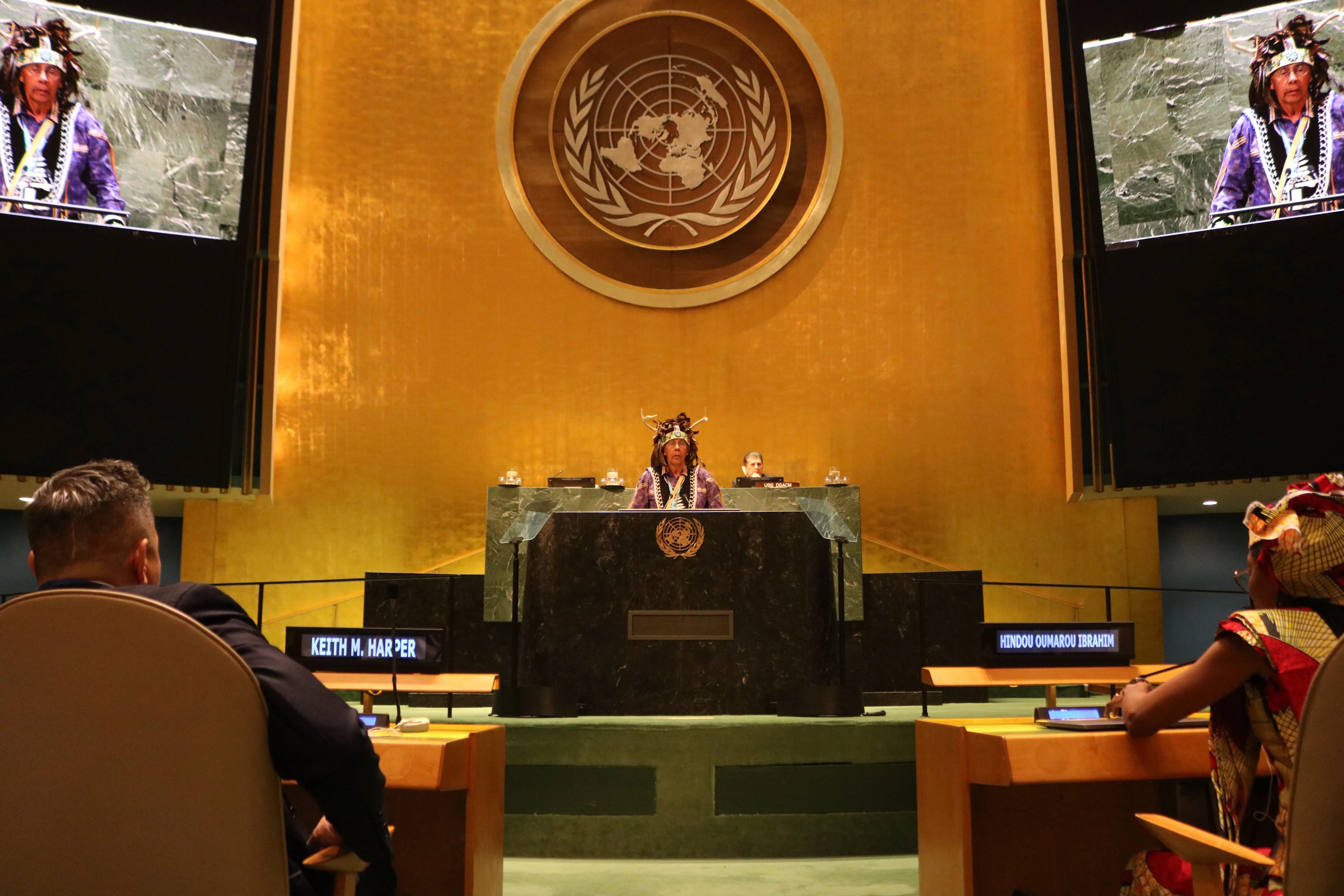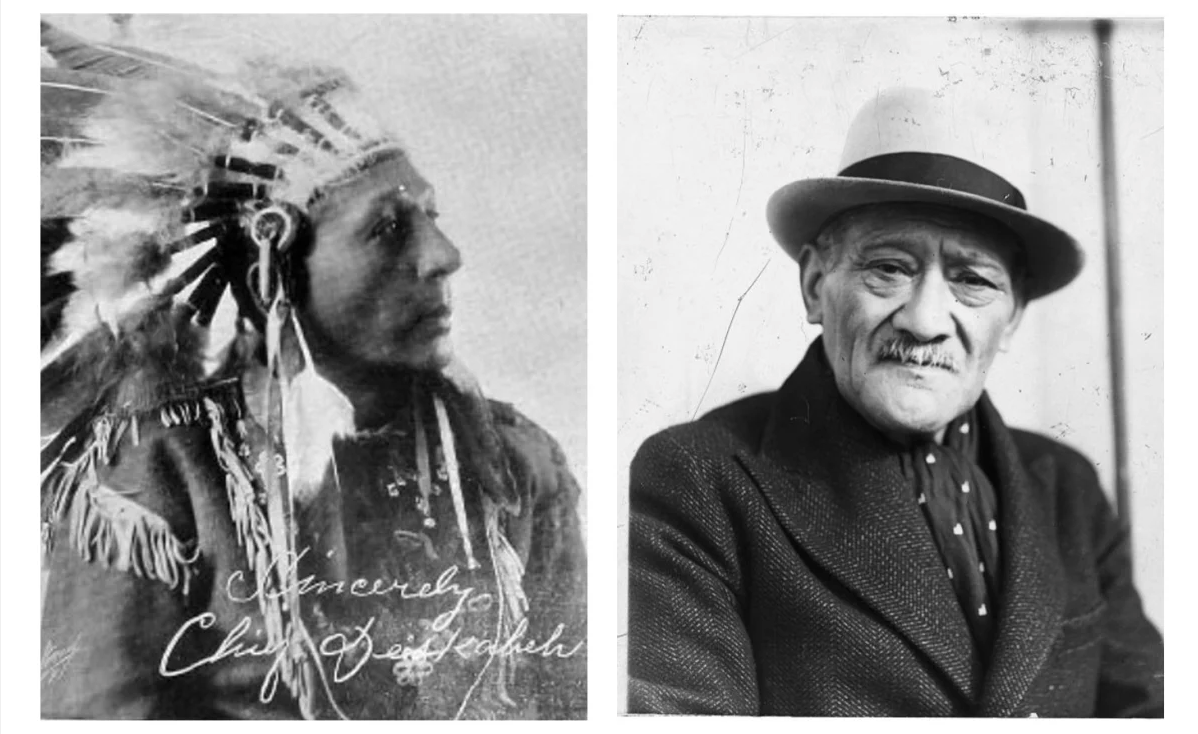
- Details
- By Joseph Lee & Jenna Kunze
This story is published as part of the Global Indigenous Affairs Desk, an Indigenous-led collaboration between Grist, High Country News, ICT, Mongabay, and Native News Online.
Colonialism and market forces are destroying the planet and affecting Indigenous peoples’ health, a draft report from the United Nations Permanent Forum on Indigenous Issues declared last week. One of only three U.N. bodies that deal specifically with Indigenous issues, the Forum’s report was the culmination of two weeks of talks around the theme of Indigenous peoples, human health, planetary and territorial health, and climate change. “The destruction of the Earth is driving a global health and humanitarian crisis,” the Forum wrote.
“It is unacceptable that we continue to hear how Indigenous leaders and human rights defenders from among Indigenous peoples are threatened, harassed, and killed for defending their home,” Forum chair Darío José Mejía Montalvo, Indigenous Zenú from Colombia, said in a closing statement.
The near-final report described the eviction of Indigenous communities to create protected conservation areas, green energy projects that violated human rights, and the killings of land defenders—particularly women and children. It made a list of recommendations to U.N. agencies and member states, including calling on the United States to release Indigenous political prisoner Leonard Peltier and decommission the Line 5 oil pipeline that passes through Canada, Wisconsin, and Michigan. The Forum also called on UNESCO to “step up” its protection of Indigenous lands and culture from mining activities like Rio Tinto’s projects in Oak Flat in Arizona and Juukan Gorge in Western Australia.
“I’m more engaged and excited about the language that we got put into this report than in years past,” Geoffrey Roth, a Standing Rock Sioux descendant and Forum member said. “I think that we made some really good progress.”
The challenge now is ensuring that the report’s recommendations are implemented by U.N. agencies and member states, over which the Forum has no enforcement power. Last year, for example, the Forum for the first time made the same recommendation about releasing Leonard Peltier, and a similar recommendation that member states, primarily Australia and New Zealand, reform their child protection policies to prevent the removal of children from Indigenous communities. In both instances, member states ignored the Forum’s recommendations.
Roth says that the Forum needs to do a better job of following up with its recommendations and working to hold agencies and countries accountable. That includes mobilizing allies in the U.N. system to follow the Forum’s recommendations, working with human rights bodies and experts to coordinate advocacy, and pressuring member states to take the Forum’s recommendations seriously.
“The Permanent Forum is not merely a single event,” Mejía Montalvo said. “Each and every one of us, stakeholders in our struggle, will return to our agencies, our region, our countries, our territories, and we will continue our work.”
But some Indigenous leaders say that for action to truly take place, the U.N. system itself needs to change – and provide Indigenous peoples access to international negotiations to influence policy, a fight Indigenous advocates have been advancing for a century, beginning in 1923 with the League of Nations. Currently, Indigenous leaders are excluded from high level U.N. bodies like the General Assembly, which decides the U.N. budget, elects member states to the Security Council, and sets other key international goals and policies.
 In the 1920s, Chief Deskaheh of the Cayuga Nation and Māori leader T.W. Ratana were blocked from speaking at the League of Nations, a predecessor to the United Nations
In the 1920s, Chief Deskaheh of the Cayuga Nation and Māori leader T.W. Ratana were blocked from speaking at the League of Nations, a predecessor to the United Nations
“We have no voice at that level,” said Kenneth Deer, a member of the Mohawk Nation of the Haudenosaunee who has worked to increase Indigenous peoples’ participation at the U.N. since 1987. “We need a voice there to defend our interest.”
The ability to wield more influence in international negotiations may be getting closer though. During this year’s Permanent Forum, Csaba Kőrösi, President of the General Assembly, held a final hearing on enhanced participation of Indigenous peoples, which refers to a process that would put Indigenous leaders closer to the level of member states. “While member states are the decision makers, Indigenous Peoples have an opportunity to significantly shape those decisions. Indigenous Peoples must have those opportunities,” Kőrösi said.
Kőrösi will prepare a summary report on the hearing to circulate to all member states, observers of the General Assembly (GA), and Indigenous Peoples by September, his office confirmed. “The next steps in this process will be decided by intergovernmental negotiations in the framework of the GA,” said spokesperson for the President of the General Assembly, Paulina Kubiak.
“The future of the planet is at risk,” said Hannah McGlade, an Indigenous Noongar member of the Permanent Forum from Australia. “Indigenous people have to be at the forefront of responses to climate change. We can’t do that unless we are properly empowered here at the U.N., and I’m sad to say that we are not at this time.”
Attendees say that the Forum is far from perfect. Indigenous leaders who attend the Forum are given three minute windows to speak, and must share the event’s timetable with non-governmental organizations and member states–the process takes days with more than a thousand speakers hoping to get their message into the Forum’s final report. One attendee, Wilfredo Tsamash, who is Awajún and a representative for the Interethnic Association for the Development of the Peruvian Rainforest, waited three days to deliver a statement at the Forum about the dangers of carbon markets and violence against land defenders in the Amazon, but was never called on to speak. “The Permanent Forum needs to change and they need to prioritize the messages coming from Indigenous organizations,” he said. The Forum’s report only includes one brief mention of the Amazon.
High costs also restrict Indigenous peoples from participating. Many Indigenous organizations can only afford to stay for a few days of the two-week gathering. “New York is a very expensive place to be for the ordinary person of the United States, let alone Indigenous peoples who come from remote and rural communities that are struggling just to be here to make a statement,” said Cristina Coc, spokesperson for the Maya Leaders Alliance of Southern Belize.
During the Forum, non-governmental organizations hold dozens of side events, and with strict, limited time during the Forum’s main sessions, the events provide space to discuss crucial topics. But they come at a cost: renting a United Nations conference room can run from $586 to nearly $2,000 for an event, making spaces available almost exclusively to advocacy organizations with deep pockets. Binota Moy Dhamai, a member of the Expert Mechanism on the Rights of Indigenous Peoples from Bangladesh, said that these costs are discriminatory against smaller organizations. “If they want to organize this kind of event, they simply can’t do it, because they don’t have money,” he said.
In his closing statement, Mejía Montalvo said that he personally heard one member state say that speaking out on certain issues would cause suffering. “That is in no way, now or at any point, acceptable, and such statements cannot be made,” Mejía Montalvo said. “They cannot, and must not, face reprisal when returning.” One attendee told Grist they delayed returning home due to safety concerns after accusing their country of human rights violations. A source familiar with the matter added that an additional two attendees have been unable to return home for fear of government retaliation. Their identities have not been revealed for their protection.
“This is our life we’re talking about,” said Cristina Coc. “That three minutes of taking the floor could result in our death.”
The Office of the United Nations High Commissioner for Human Rights declined to comment on threats made to Forum participants. Mejía Montalvo urged member states to guarantee the safe return of all Forum participants.
Next year, the Forum will focus on a theme of self-determination and Indigenous youth. Meanwhile, the report will wind its way through the U.N. system to the General Assembly for a vote this fall to reaffirm non-binding human rights standards for Indigenous Peoples.
Help us defend tribal sovereignty.
At Native News Online, our mission is rooted in telling the stories that strengthen sovereignty and uplift Indigenous voices — not just at year’s end, but every single day.
Because of your generosity last year, we were able to keep our reporters on the ground in tribal communities, at national gatherings and in the halls of Congress — covering the issues that matter most to Indian Country: sovereignty, culture, education, health and economic opportunity.
That support sustained us through a tough year in 2025. Now, as we look to the year ahead, we need your help right now to ensure warrior journalism remains strong — reporting that defends tribal sovereignty, amplifies Native truth, and holds power accountable.
 The stakes couldn't be higher. Your support keeps Native voices heard, Native stories told and Native sovereignty defended.
The stakes couldn't be higher. Your support keeps Native voices heard, Native stories told and Native sovereignty defended.
Stand with Warrior Journalism today.
Levi Rickert (Potawatomi), Editor & Publisher

